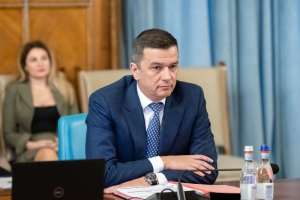Social convulsions have been a constant in the first three months of the current year, with a peak in January, when almost half of the country's major cities were blocked by farmers' and transporters' protests, which lasted for three weeks until early February. . Under the pressure of the street, the Government was forced to intervene and take certain firefighting measures by which it adjusted the tax reform adopted last year by law 296/2023 and GEO 115/2023. These measures agreed with the protesters and taken during the first quarter led to an increase in budget expenditures allocated for various types of subsidies granted to farmers and transporters.
The echoes of the massive protests in January did not die out well either, because they were followed in February and March by the protests of the Health, public finance, police and other structures in the public administration, movements following which the Government was forced to adopt several memoranda by which he gave free rein to hiring in the budget system, although at the end of 2023 he claimed that in 2024 there will be no more hiring at the state except on a temporary basis. Thus, the Executive has unlocked almost 5,000 positions in Health, several thousand other positions for the institutions subordinated to the Ministry of Internal Affairs, several hundred positions in the institutions subordinated to the Ministry of National Defense and thousands of positions in the central and local administration, unlocking which will lead to a consistent increase in budget expenditures.
These measures had a negative impact on public finances, an impact that, according to the statements of the Minister of Finance, Marcel Boloş, led, based on preliminary data, to a deficit of 2.07% of the Gross Domestic Product, only in the first quarter of the year 2024, given that the state budget for the current year estimates that on December 31 we will have a deficit of 5% of GDP.
The fact that the Government is unable to keep budget expenditures under control was noted by European Commission officials who visited our country in the second part of March to assess the implementation stage of the National Recovery and Resilience Plan. On that occasion, European officials stated that, under the current conditions, it is expected that our country will not meet the assumed budget deficit target for this year and that the real deficit will be 7% of GDP on December 31, 2024.
In these conditions, no one was surprised that, in order to cover the budget expenses, the Ministry of Finance issued new securities and bonds to borrow from the banking market and from the population, nor that the inflation rate experienced an increase on the first two months of the current year.
In order to keep the financial situation under control at the macroeconomic level, the Board of Directors of the National Bank of Romania had to maintain at the same level the reference interest rate (7% per year), the interest rate for the credit facility (Lombard ) at 8% per annum, the related interest rate at 6% per annum.
Even under these conditions, the Fitch rating agency reconfirmed, on March 1, 2024, the rating related to Romania's government debt at BBB-/F3 for long- and short-term foreign currency debt, as well as the stable outlook.
After this good news, the Government received another one on March 8 from ICSID - the international arbitration court attached to the World Bank, which decided to give victory to Romania in the Roşia Montană file, in which the Canadian company Gabriel Resources requested compensation of almost 6.7 billion dollars. The whole file was a mess during the first two months of the year, from the perspective of the risk of losing the trial, a risk that was exacerbated by unsolicited public statements by Prime Minister Marcel Ciolacu and the Minister of Finance, Marcel Boloş, statements that at one point had positive effect in the capital market, leading to a near tripling of the share price of Gabriel Resources. Stocks whose value immediately collapsed to zero after the March 8 ICSID decision.
For the first quarter, we also mention the desire expressed in February by Klaus Iohannis to become NATO Secretary General this year, as well as the entry on March 31, 2024 of our country into the Schengen Area - of free movement of goods and people - with air borders and maritime, without having a clear perspective on the entry with land borders, although Prime Minister Ciolacu stated that this will happen by December 31, 2024.
• January - three weeks of protests, 76 demands
The political scene in our country was suddenly awakened to reality on January 9, when hundreds of farmers began to move to the Capital, dissatisfied with the fiscal measures imposed by the Government at the end of last year and with the generalization, starting from January 1, 2024, of the Ro e-Invoice and Ro e-Transport digital reporting systems, but also with the increase in fuel excises and tariffs RCA. Because in the first days of the protest the central authorities chose to ignore the farmers, they were joined by the transporters, who took over part of the requests of the agricultural producers, and the protest gradually expanded to 22 counties of the country, in which several roads were blocked, traffic was difficult.
Confronted with this situation that tended to degenerate, especially since the entrances to the Port of Constanţa were also blocked by protesters, thus compromising the transit of Ukrainian grain, Prime Minister Marcel Ciolacu, Minister of Finance Marcel Boloş and Florin Barbu, Minister of Agriculture and Rural Development they chose to act as a firefighter and make decisions under the pressure of those on the street, amending several normative acts in two weeks and setting up working groups to amend other normative acts in February and March. When the members of the Government thought, after the meetings of January 11 and 18, that they succeeded in quelling the protest, the farmers and transporters presented them with a list of 76 demands for which Prime Minister Marcel Ciolacu and his colleagues had to assume new deadlines solution. The top 10 claims out of 76 were:
- the recognition of road transport as a strategic economic sector and the development of measures to support this economic sector in order to remain competitive and continue to bring direct revenues to the state budget;
- reducing the RCA to 5,000 lei at a technically permissible maximum mass of 40 tons and introducing the traction and national/international assistance into the RCA policy;
- the possibility of recovering a percentage of the fuel excise for licensed transport companies directly from the pump;
- the introduction of a non-taxable food allowance for posted workers, in the amount of 60 euros/day, to be added to the maximum ceiling of 87.5 euros/day within which the posting allowance can be granted and the increase of the non-taxable ceiling from three to four basic salaries;
- shortening border crossing times by amending OG 43 and complying with European Regulation 1100/2008 on customs controls (which provides for the elimination of mass and size controls at border crossing points to streamline traffic across borders);
- moving the controls of the rovinette, the scale and the measurement of the gauge on the national territory at least 15 kilometers from the border crossing point;
- the cancellation of Law 370/2022 which changes the ceiling for establishing the type of taxation for micro-enterprises from 1,000,000 euros to 500,000 euros and returning to the same ceiling of 1,000,000 euros, according to the old law;
- the granting of APIA subsidies related to the current year until the end of January of the following year, including for farmers in the classical control sample and through remote sensing, as well as the acceleration of the processes for financial compensations associated with the other direct payment schemes (eco-schemes, measures of agro-environment, etc.);
- regulating trade in markets by prioritizing local trade, eliminating fake producers;
- simplifying the granting of agricultural aid by de-bureaucratizing the way of submitting single applications.
Of these, eight were settled during the first three months of the current year.
Prior to the respective protests, the Government had to intervene in order to solve an acute problem in the health system, which is facing a serious personnel crisis, and ordered on January 11 by memorandum to exempt this sector from the provisions of the emergency ordinances issued last fall, which established the ban on new employment in the budget sector. Through that memorandum, the urgent hiring of 4,500 doctors was allowed, after which the Government decided to hire almost 2,000 more people in the social assistance system.
Practically, through all the measures taken in the first month of the year, the Ciolacu Cabinet mitigated part of the fiscal changes ordered at the end of last year and suspended part of the reform of the budget system proposed by Marcel Boloş, the Minister of Finance, which is likely to have an effect negative on the budget execution for the first quarter of 2024, which will show us whether the Government will manage to maintain at the end of the year the budget deficit target approved by the European Commission.
In this context, the decision of January 12 of the Board of Directors of the National Bank of Romania by which the reference interest rate was maintained at 7%, the interest rate for the credit facility (Lombard) at 8% and the interest rate at 6% days related to the storage facility, no longer surprised anyone.
However, the warning regarding the new fiscal-budgetary year was given by the Government, which decided to increase the maximum debt ceiling of the state by contracting medium-term loans from 62 billion euros to 68 billion euros, which shows the need for the Executive to to further finance the current budget deficit. Especially since, since the beginning of the year, pensions have been increased by 13.8%, and in September a new substantial increase will follow, after the recalculation of pensions for millions of taxpayers.
• February - Roşia Montană and Pfizer, two important cases
The measures ordered following the massive protests in January made their effects felt already in the first month of the year, the budget execution showing on January 31, 2024 a budget deficit almost double compared to January 2023, i.e. 7.89 billion lei (January 2024) compared to of 4.02 billion lei (the deficit from January 2023).
The need for money in the state budget forced the Ministry of Public Finance to launch, in mid-February, on the international financial markets two tranches of bonds with maturities of 7 years and 12 years, through which it attracted 4 billion euros, although the subscription amounted to 14.8 billion euros. Moreover, also in the same period, the Ministry of Finance launched a new issue of government bonds, with maturities of 1 and 3 years, with annual interest rates of 6% and 6.75%, respectively, issue which is to end in during March.
In all this fragile financial context, the National Bank of Romania tries to maintain a balance, so in February it also maintained the level of the monetary policy interest rate at 7%, the interest rate for the lending facility at 8% (Lombard) and at 6 % interest rate on the deposit facility, even though inflation stood at 7.4% at the end of January, up from the end of 2023.
However, the need for budget revenues is constantly increasing, if we also take into account the decisions of the CSAT meeting on February 21, which gave the green light to the legislative project on voluntary military service, a service which, however, requires the three-month payment of those who want to to prepare in this sense, but also a substantial bonus in the fourth month.
In addition to the above expenses, those for the European Parliament and local elections that the PSD-PNL coalition decided to combine on June 9 will be added, for the presidential elections that would take place during September, but also for the parliamentary elections which will take place at the beginning of December, and the government has already asked the ministries to allocate, at least for the first election, part of the sums received from the state budget, which they would later recover, during the budget rectification.
What marked the month of February, however, were the controversial statements of Prime Minister Marcel Ciolacu regarding the Roşia Montană case, although from September 2023 - when the debate procedure at the international arbitration court ended - and until February 1, 2024, the head of the Government had no public outing on this matter.
At the end of February, the prime minister seems to become categorical in his statements regarding Roşia Montană, giving the impression that it is very certain that we will have to pay compensation as a result of this process, early on, on February 24, he declared: "Roşia Montană (was used ) to invent a political entity (...) and now we have the bill: according to some, two billion dollars, according to others, five billion dollars. This is the bill that all Romanians will pay. At some point given, someone wanted to use Roşia Montană, «Uniţi Salvăm Roşia Montană», to create (the Union) Save Romania. This is the truth".
If on February 1 Prime Minister Ciolacu was talking about the court's decision that will come by February 10, about the payments that should be discussed "with those who are likely to win this trial" and about making available the documents and decisions taken "so that Romania loses this process", statements later completed by the Minister of Finance Marcel Boloş, who stated that it is possible that the Government will be obliged to pay compensation of 6.7 billion dollars, on March 7 - only one day before the ICSID published the decision favorable to Romania - Marcel Ciolacu posed as a defeatist and stated that he is willing to organize a referendum for Roşia Montană.
"Let's see if the Romanians agree to start gold mining", stated Marcel Ciolacu on March 7, the respective solution being brought into discussion after Minister Boloş stated, on the same day, that it is possible that, instead of paying compensation for 6.7 billion dollars, the Romanian state to offer those from Gabriel Resources the possibility of continuing the mining project in Roşia Montană.
However, the next day, on March 8, ICSID rejected the action of the Canadian company Gabriel Resources and, immediately, Marcel Ciolacu and Marcel Boloş posed in the victorious and claimed to have achieved an important victory for Romania.
For the attitude of Prime Minister Marcel Ciolacu, as a result of which the shares of Gabriel Resources and RMGC experienced a double increase on the Toronto stock exchange, former Prime Minister Dacian Cioloş filed a criminal complaint with the General Prosecutor's Office, and the former Minister of Transport, Cătălin Drula, submitted a complaint criminal case at the DNA.
At the beginning of February, the prime minister also announced that our country chose another international file, opened by the Pfizer company for the non-procurement of a huge amount of anti-Covid 19 vaccines ordered by the Cîţu government.
Therefore, in order to better prepare defenses in international cases, the Ciolacu government adopted, on February 1, a memorandum authorizing the Ministry of Finance to contract legal assistance and representation services in order to ensure the representation of Romania in the case registered with no. F5331-23, pending before the Francophone Court of First Instance in Brussels, in which the company Pfizer - BioNTech sued Romania for the payment of all the anti-Covid vaccines purchased as part of the European Union supply contract, signed in 2021. According according to the data in the file, the Pfizer company is asking the Bucharest government to pay 564 million euros for the 28.94 million vaccines ordered.
• March - Iohannis wants the headship of NATO, air and maritime Schengen for Romania
The government continued, in the last month of the first quarter of the current year, to adopt decisions regarding the extension of some price capping measures and to dilute the provisions of law 296/2023 and GEO 115/2023 regarding the reduction of public sector spending, adopting several normative acts and memoranda operating wage increases and allowing new state employment. In this context, the budget deficit of 1.67% of GDP recorded at the end of February continued to grow in the first month of spring, reaching, according to the statements of Minister Marcel Boloş, to 2.07% of GDP on March 31, 2024, a percentage that from the point of view of the finance minister, it is a good one because it is less than 2.5% of GDP - as much as the Government's estimate represented.
In these conditions, no one was surprised that on March 20 the European Commission officials who came to Bucharest to present the annual progress report of our country regarding the implementation of the National Recovery and Resilience Plan declared that, if the PSD-PNL government led by Prime Minister Marcel Ciolacu will not make the reforms assumed in the PNRR, Romania's budget deficit will jump by 7% of GDP at the end of 2024, well above the 5% target assumed this year by the Executive through the state budget law adopted by Parliament.
Moreover, in the report published on March 25 by the European Commission regarding the macro-economic imbalances in our country, the officials of the Community Executive show that, despite some improvements, Romania still faces the vulnerability of tax revenues, and large budget deficits and the rate high inflation rates, which are all above pre-pandemic levels, make the national economy potentially vulnerable to shocks.
The statements of European officials removed the optimism of political decision-makers in Bucharest who announced at the beginning of the month, that on March 1, the rating agency Fitch reconfirmed the rating of Romania's government debt at BBB-/F3 for long-term and short-term debt in foreign currency, as well as and stable outlook.
The announcement regarding our country's rating came just one week before the international arbitration court attached to the World Bank, ICSID, published the decision in the Roşia Montană case, which rejected the action filed by the Canadian companies Gabriel Resources and Roşia Montană Gold Corporation , and implicitly the compensation of billions of dollars requested by the representatives of the two companies. That decision, the reasons for which would be fully published after 90 days from March 8, was opposed to the statements made in the first two months of the year by Prime Minister Marcel Ciolacu and Finance Minister Marcel Boloş who stated that it looks like our country will lose this lawsuit and that we will have to pay damages of up to 6.5 billion dollars.
Also at the beginning of March (March 6-7), PNL organized the Congress of the European People's Party in Bucharest, an event in which most of the European leaders present - with the exception of the Austrian ones - assured us of their support for our country's entry into the Schengen area and with land borders until the end of this year and where Ursula von der Leyen received the vote by which she was confirmed as the EPP candidate for a new mandate as president of the European Commission.
The EPP Congress also did not approve the release of the list of PNL candidates for the June 9 European Parliament elections, as the liberals decided to run on a joint list with the social democrats and they also established, within the governing coalition, that on June 9 local elections will also take place.
Regarding international representation, we mention that on March 12, President Klaus Iohannis announced from the Cotroceni Palace that he is entering the race for the appointment of the future Secretary General of NATO and that he is undertaking this candidacy on behalf of Romania.
The main notable event of the first month of spring was recorded on March 31, when our country entered, after 11 years in which it met all the criteria required by the acquis communautaire, into the air and maritime Schengen, thus removing control from the two borders regarding the identity of persons.
• Trade addition to basic products, capped until the end of 2024
On January 31, the Government approved an emergency ordinance by which it decided to extend the measure of capping the commercial addition to 14 basic foods, a measure established for 90 days by GEO 67/2023 and then extended for another 90 days at the end of October of the year last. By the respective normative acts, the commercial addition is capped at 20% for retailers and 5% for the entire distribution chain.
The normative act approved at the end of January establishes, for the agriculture and food industry sector, the temporary measure to combat the excessive increase in prices of some agricultural and food products for a period of 60 days, from the date of its entry into force. The new emergency ordinance removed the ceiling for rice, cozonac, tomato broth, margarine, yeast, minced meat and added butter up to 250 grams and magiun up to 350 grams.
The respective emergency ordinance and GEO 67/2023 reached the Parliament, which decided during March that the respective ceiling should extend until December 31, 2024, the law being promulgated by President Klaus Iohannis on March 27.
• Vulnerable consumers receive support from the Government
The government approved an emergency ordinance on February 28, which continues to ensure the right to home heating aid and energy supplement for the rest of the cold season to people in vulnerable categories. It is about 800,000 households, at the national level, and the members of the Ciolacu Cabinet have decided that, when establishing the rights to these forms of support, the increases in pension rights and salary rights entered into force from January 1, 2024 will not be taken into account , because these increases - by 13.8% of the pension point, respectively by 5% of the basic salaries for staff paid from public funds, compared to the level granted for December 2023 - would have put some of the people in the category of vulnerable consumers of energy in the situation of ending their right to home heating aid and the energy supplement or receiving them in smaller amounts than those previously received, with the risk of not being able to pay their bills.
• Cyber attack on the Chamber of Deputies
On January 30, state institutions were on alert after finding out the Parliament's vulnerability to cyber attacks, attacks that managed to breach the Chamber of Deputies' databases and copy 316 files, including personal data of parliamentarians, including contracts or medical records. The Minister of Digitization, Bogdan Ivan stated that following the cyber attack on the Chamber of Deputies, 316 files were copied by hackers, of which 190 documents were scanned and 36 were editable, the total volume of data accessed being 300 Megabytes. Following the attack, the hackers posted some of the documents on the Internet, including the identity card of Prime Minister Marcel Ciolacu. Because of this, the head of the Government announced that he will request the issuance of a new identity card, an action that other fellow deputies whose documents were accessed following the cyber attack will also do.
• RCA price cap extended for another 90 days
Another measure taken by the Government in the first quarter is the extension, starting from April 1, by three months of the period of application of the maximum RCA insurance premium rates practiced by insurers on February 28, 2023. The Financial Supervision Authority and the Ministry of Finance have argued this measure by combating excessive price increases and the gradual stabilization of the RCA insurance market, in order to avoid negative effects in other sectors of the economy.
We remind you that the maximum premium rates were set at the level of their own premium rates that were practiced by each RCA insurer on February 28, 2023, following the bankruptcies of the City Insurance and Euroins Romania companies, with the possibility that these prices may be adjusted with a percentage of maximum 6.8%. The rates are applied in the case of RCA contracts concluded after the date of entry into force of the decision.
The distribution commissions related to RCA contracts are limited to a maximum of 8% of the first net of distribution expenses, for a period of 3 months from the date of entry into force of the decision.
In the normative act by which the price cap on RCA policies was extended, the Government shows that on December 31, 2023, out of the total number of vehicles in the national car park, namely 10,333,293, a number of 7,053,399 vehicles were insured, and that in between January and March 2024, more than 21,000 requests for allocation of high-risk policyholders were registered, which means that each RCA insurer took on a number of approximately 2,600 such policyholders.
• IMM Plus, revived until June 30, 2024
On March 7, the Government decided to approve the continuation of the IMM Plus state aid scheme and its components until June 30, 2024. At the same time, the Executive increased the maximum values for this scheme, from 2 million euros to 2.25 million euros per enterprise , respectively from EUR 250,000 to EUR 280,000 for each enterprise operating in the primary agriculture sector and from EUR 300,000 to EUR 335,000 for each enterprise operating in the fisheries and aquaculture sectors. The total budget of the state aid scheme is approximately 12.5 billion lei (the equivalent of approximately 2.5 billion euros). Within this budget, guarantees can be granted within the limit of the total ceiling of 11.1 billion lei, the equivalent in lei of approximately 2.22 million euros. Through the implementation of this scheme, it is estimated that state aid will be granted to a maximum of 11,500 beneficiaries.
The aid scheme is implemented by the Ministry of Finance through the National Credit Guarantee Fund for Small and Medium Enterprises S.A. - IFN, Rural Credit Guarantee Fund IFN - S.A. and Fondul Român de Contragarantare S.A.
The European Commission approved the reopening of the IMM Plus scheme at the beginning of April.




























































